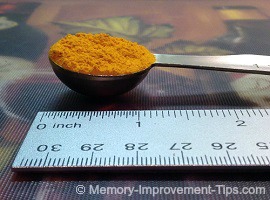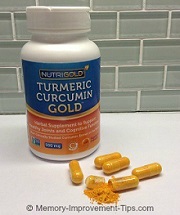- Home
- Better Memory
- Diet and Memory
- Side Effects of Turmeric
Is Turmeric Safe? 5 Side Effects of Turmeric to Know About Before You Take It
Everyone is talking about the health benefits of the Indian spice turmeric. But there are 5 side effects of turmeric - and its active ingredient, curcumin - that you need to be aware of before adding it to your diet.
It's best to avoid taking turmeric in food or as a turmeric supplement if you have any of the medical conditions below.
Before I jump into an explanation of turmeric's side effects, I want to point out that turmeric in reasonable doses is considered safe for anyone in general good health. As a spice, it's been used in traditional Indian cuisine for centuries.
According to the University of Maryland Medical Center, "Turmeric in food is considered safe. Turmeric and curcumin supplements are considered safe when taken at recommended doses." The National Institutes of Health (NIH) classifies turmeric as "likely safe".
Many positive health benefits are associated with turmeric's anti-inflammatory properties. Turmeric has been used to ease many inflammation-related disorders and conditions including upset stomach, intestinal gas relief (including for lactose intolerance), psoriasis, eczema, rheumatoid arthritis, fibromyalgia, sciatica, and osteoarthritis.
Researchers are investigating turmeric's ability to protect brain cells after a stroke. And as I've reported, turmeric may even protect against the effects of Alzheimer's dementia.
Note: Take a look at coconut oil as well if you are looking for alternative treatments for Alzheimer's or for ways to lower your risk.
However, there are potential negative health-related side effects of turmeric. Turmeric is not for everyone, and there are situations when you likely should discontinue taking it.
Most Common Turmeric Side Effects
Below I've outlined the 5 most common turmeric side effects as reported in the medical literature. If any of these conditions apply to you, proceed with extreme caution and only under the advice of your health care provider.
Blood Thinning. According to the National Institutes of Health, turmeric may slow blood clotting. Avoid combining turmeric with anticoagulant and/or antiplatelet drugs. If you take blood thinning medication, consult with your health provider before eating turmeric in food or taking turmeric supplements.
Examples of medications that act as blood thinners include aspirin, ibuprofen (Advil, Motrin, etc.), warfarin (Coumadin), naproxen (Anaprox, Naprosyn, etc.), and others. Don't take turmeric with these or related drugs.
Since turmeric can slow blood clotting, avoid it if you take herbal supplements that slow clotting. The NIH website mentions angelica, clove, danshen, garlic, ginger, ginkgo, Panax ginseng, red clover, and willow as examples.
Due to blood thinning side effects of turmeric, stop taking turmeric at least two weeks before any surgical procedure.
Diabetes. Turmeric may lower blood sugar. Avoid turmeric if you take diabetes medications, since turmeric could cause your blood sugar to fall even further. This could result in hypoglycemia.
Gallbladder. The NIH recommends avoiding turmeric if you currently have problems with your gallbladder. If you have gallstones or a bile duct obstruction, turmeric may cause your condition to worsen.
Pregnancy. Turmeric should be avoided during pregnancy. According to the NIH, turmeric may stimulate the uterus or promote a menstrual period. NIH also recommends not taking it during breast feeding.
Stomach Complications. Interference with antacid medications is a possible side effect of turmeric, according to the University of Maryland Medical Center. Turmeric may cause increased stomach acid if taken with antacid drugs such as Tagamet, Pepcid, Zantac, Nexium, or Prevacid.
Although research shows turmeric may be effective as a treatment for upset stomach, it may aggravate gastric reflux disease. If you have gastroesophageal reflux disease (GERD), pay attention to how turmeric affects you. Discontinue taking it if you experience side effects like worsening reflux.
Recommended Turmeric Dosage

Ground Turmeric: 1 Teaspoon (2 grams)
What's an appropriate dosage to avoid the side effects of turmeric? According to the medical community, about 2,000mg is the maximum amount of standardized turmeric curcumin you should take per day.
When cooking with ground turmeric powder, the University of Maryland recommends 1 to 3 grams per day. One gram of ground turmeric powder is about ½ teaspoon. Three grams is about 1½ teaspoons of ground turmeric powder.
According to the University of Maryland Medical Center, there is no recommended dose for children. For adults, the general recommended dose is 400-600mg of standardized curcumin powder 1-3 times per day. The NIH suggests you can take up to 500mg up to 4 times per day.

The NIH's specific dosage recommendations include:
Osteoarthritis: 500mg twice daily of a turmeric supplement containing Meriva. Or, 500mg four times daily of a non-commercial product.
Rheumatoid Arthritis: 500mg twice daily of a Curcumin BCM-95 extract
Upset Stomach (Dyspepsia): 500mg of turmeric four times daily.
The turmeric supplement I take, Nutrigold's Turmeric Curcumin Gold, contains 500mg of turmeric per capsule. To avoid side effects of turmeric, don't take more than 3 to 4 capsules of supplements like this one per day based on NIH recommended dosages. The dose shown on the label is 1 to 3 capsules per day.
Always Consult with Your Health Care Provider
Now you're armed with information on possible side effects of turmeric, as well as recommended dosages. Be smart with how you take turmeric as a herbal supplement or use it in cooking.
Especially steer clear of turmeric if you are pregnant or have issues related to blood sugar, blood clotting, gall bladder, or stomach acid. And remember, do not take turmeric within two weeks of surgery.
Are the turmeric side effects above the only issues you can encounter? The medical community doesn't rule out other problems.
There have been scattered reports of altered heart beat, delusion, mild fever, even kidney stones after taking extremely large doses of turmeric.
When in doubt, talk to your personal doctor about whether turmeric is safe for you. Enjoy the benefits of turmeric if appropriate for your situation, but as with all supplements, don't take unnecessary risks.
[+] References for Side Effects of Turmeric
Published: 07/14/2014
Last Updated: 06/11/2020

Newest / Popular
Multiplayer
Board Games
Card & Tile
Concentration
Math / Memory
Puzzles A-M
Puzzles N-Z
Time Mgmt
Word Games
- Retro Flash -
Also:
Bubble Pop
• Solitaire
• Tetris
Checkers
• Mahjong Tiles
•Typing
No sign-up or log-in needed. Just go to a game page and start playing! ![]()
Free Printable Puzzles:
Sudoku • Crosswords • Word Search







